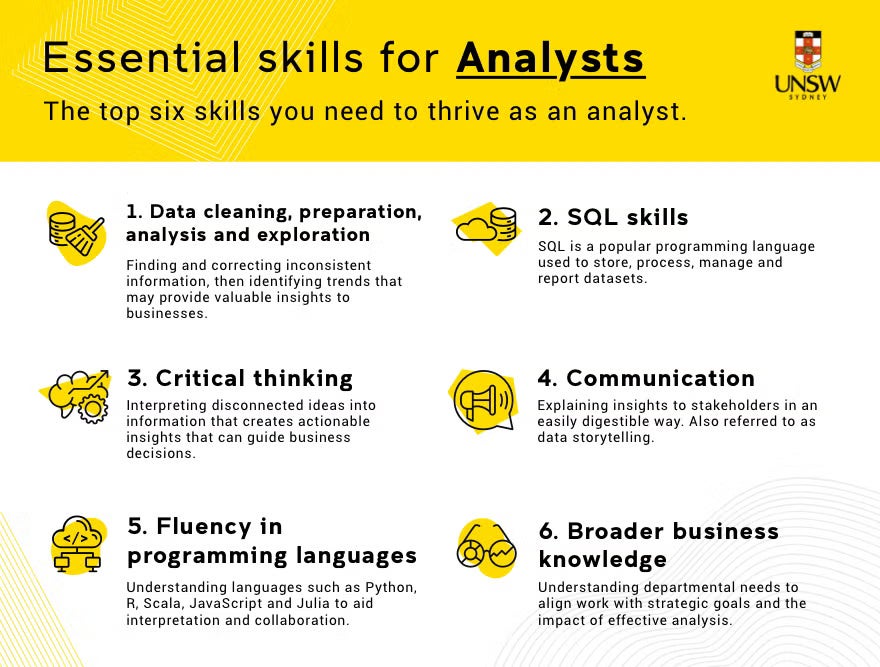The field of data analytics is growing and evolving by the day. The demand for data analysts, especially those who hold postgraduate qualifications, is booming. This trend will only continue as more companies discover greater value in interpreting the massive amounts of data available to them.
Data analysts have proven to be vital not only in forming business strategies but also in product development, staff and customer experience, service offerings and much more.
Today, the demand for data analysts continues to grow. TechSci Research reports that the Australian data analytics market will grow at a rate of 20 per cent per year until 2025, with the demand for data analytics executives also growing exponentially.
To secure a position in this burgeoning field, it’s important to cultivate the right set of data analyst skills.
Six data analyst skills for success
Demand for data analysts is expected to grow in both the near term and far into the future. However, data analytics is a complex, fast-changing profession. Data analysts also bear considerable responsibility, given that they are responsible for sifting through huge swathes of data to help drive business decisions. For all of these reasons, those in the profession must have a special set of data analyst skills.
Here are the six most important skills for data analysts:
1. Data cleaning, preparation, analysis and exploration
These essential data analyst skills comprise a large portion of a data analyst’s job.
The first phase of data analysis involves data cleaning and preparation. Here, data analysts retrieve data from multiple sources and prepare it for analysis by “cleaning” it. Cleaning the data involves identifying missing or inconsistent information that may affect analysis.
The next phase is analysis. Here, analysts use the available data to answer a specific business question. Alternatively, they may do what’s called “exploring” the data. Data exploration involves looking for trends that may help inform business insights without a specific question.
2. SQL skills
When most data is stored in a database using a ubiquitous database programming language, a data analyst needs to be fluent in that language. This statement is true even if the language — SQL — is nearly 50 years old.
A 2022 Statista survey showed that approximately 50 per cent of all developers use SQL. It’s very good at what it does and it’s been battle tested over the decades. This means it’s mature, reliable and applicable to the majority of data queries. It saves lots of coding time and, amazingly, is also relatively simple — so much so that people in non-technical roles are often asked to become familiar with it.
3. Critical thinking capabilities
It’s no secret that any type of analysis requires critical thinking, but what exactly does that mean? In basic terms, critical thinking is the ability to make connections between sometimes disconnected ideas. However, it also involves the following:
- Having the ability to complete an objective analysis of a challenge, a problem or an opportunity in order to properly assess and reconstruct it
- Understanding facts and figures without the interference of opinion or bias
- Knowing how to undertake a deliberate and systematic analysis of information
These data analyst skills are all essential for day-to-day responsibilities. Critical thinking skills allow a level of engagement that goes beyond superficial and leads to a deeper understanding.
Fortunately, most people attracted to data analysis naturally lean towards being critical thinkers. Leading analytics educators help take this natural inclination further by developing critical thinking in their students.
4. Communication skills and tools
The best idea in the world will never get off the ground if it can’t be clearly communicated. Similarly, brilliant data analysis that isn’t reported in a way that stakeholders can easily understand and digest is likely a waste of time.
Being able to process numbers is only the first part of the job. Explaining what those numbers mean to decision makers comes next.
Communication skills required for a data analyst involve:
- Making results meaningful to others
- Applying clear verbal communication and storytelling skills
- Understanding business strategy and adapting communications accordingly
- Having a good knowledge of data visualisation software
5. Be fluent in several programming languages
The more scripting and statistical languages you know, the more employable you may be. In addition to SQL, five more key programming languages follow:
Python
After SQL, Python is one of the most widely used data analysis programming languages. It’s an open-source, easy-to-use language that’s dynamic and supports multiple paradigms.
Its many benefits include the following:
- It has fewer than 1000 iterations
- It’s fast and agile at data manipulation
- It’s easy to read in a spreadsheet as it can create CSV outputs
R
R is a high-level open-source language used for statistical computing. It has multiple useful libraries for analysis.
R is particularly helpful for analysing data sets. However, it’s a more challenging language to learn than Python, as it has many more iterations.
Scala
Compared to SQL, Scala is a relatively new programming language. Initially created in 2003, Scala addresses issues with Java, but it can also assist with everything from web programming to machine learning.
From a data analysis perspective, it’s also a scalable language that can handle large volumes of data, and it supports functional concurrent and synchronised processing.
JavaScript
JavaScript can be extraordinary for data analysts: it’s a great tool to help create dashboards and for data visualisation.
JavaScript also has other benefits, including the ability to handle multiple tasks at once. It can be embedded in everything from web applications to electronics. It’s also easily scalable.
Julia
Julia was specifically developed for fast and high-performance numerical analysis.
Julia is also handy for implementing mathematical concepts and can help deal with matrices. It can be useful in back- and front-end programming as well.
Fluency in a number of programming languages is important for not only data analysis but also collaboration. Collaboration is key in the data analysis profession and fluency in several languages enables analysts to communicate with each other and interpret their peers’ work.
6. Broader business knowledge
Other topics important for successful careers in data analytics include team management, change management, staff experience, customer experience and business strategy.
This combination of data analyst skills means that these professionals are also proficient business people who understand the challenges facing modern companies today – and can identify solutions to those challenges.
Data analyst salary and demand in Australia
According to Salary Explorer, data analysts in Australia in 2023 are likely to see their salaries increase by 11 per cent every 17 months.
Average salaries for data analysts in Australia are also higher than most. According to Seek.com, the average salary of data analysts ranges from AUD $85,000 to AUD $105,000.
A range of soft and technical data analytics skills, from change management and business engagement to knowledge of various analytical methods, can be required for data analysis roles.
Advance your data analyst skills
For true success in business, specialists in any industry must develop a broader understanding of business itself. The most valuable players in an organisation are those who understand what their team-mates require and know how to deliver to meet those needs. This predictive ability is part of the magic and power of data analysis, meaning data analysts are in the perfect position to impress, as long as their business knowledge is up to date.
Find out how to learn these vital data analysis skills and more with our Master of Analytics.





